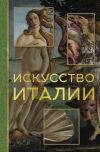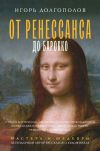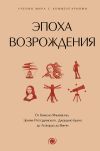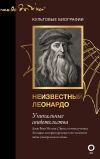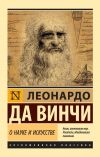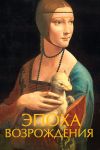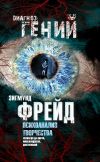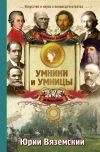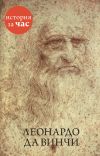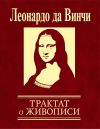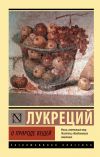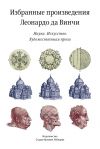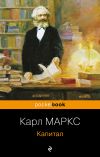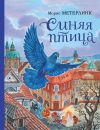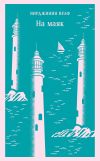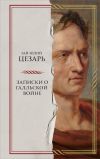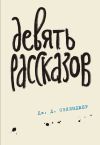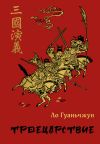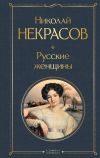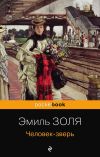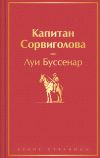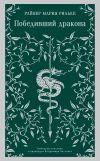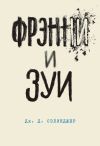Текст книги "Ренессанс. У истоков современности"
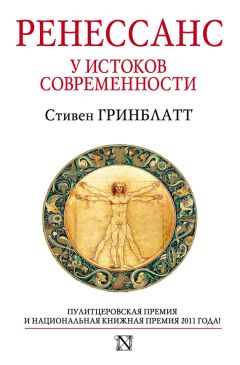
Автор книги: Стивен Гринблатт
Жанр: Зарубежная образовательная литература, Наука и Образование
Возрастные ограничения: +16
сообщить о неприемлемом содержимом
Текущая страница: 20 (всего у книги 22 страниц)
Избранная библиография
SELECTED BIBLIOGRAPHY
Adams, H. P. Karl Marx in His Earlier Writings. London: G. Allen & Unwin, 1940.
Adams, John Quincy. “Dinner with President Jefferson”, Memoirs of John Quincy Adams, Comprising Portions of his Diary from 1795 to 1848, ed. Charles Francis Adams. Philadelphia: J. B. Lippincott, 1874–77, pp. 60–61.
Alberti, Leon Battista. The Family in Renaissance Florence, trans. Renée Neu Watkins. Columbia, SC: University of South Carolina Press, 1969, pp. 92–245.
Dinner Pieces, trans. David Marsh. Binghamton, NY: Medieval and Renaissance Texts and Studies in Conjunction with the Renaissance Society of America, 1987.
Intercenales, ed. Franco Bacchelli and Luca D’Ascia. Bologna: Pendragon, 2003.
Albury, W. R. “Halley’s Ode on the Principia of Newton and the Epicurean Revival in England”, Journal of the History of Ideas 39 (1978), pp. 24–43.
Allen, Don Cameron. “The Rehabilitation of Epicurus and His Theory of Pleasure in the Early Renaissance”, Studies in Philology 41 (1944), pp. 1–15.
Anon. “The Land of Cokaygne”, in Angela M. Lucas, ed., Anglo-Irish Poems of the Middle Ages: The Kildare Poems. Dublin: Columbia Press, 1995.
Aquilecchia, Giovanni. “In Facie Prudentis Relucet Sapientia: Appunti Sulla Letteratura Metoposcopica tra Cinque e Seicento”, Giovan Battista della Porta nell’Europa del Suo Tempo. Naples: Guida, 1990, pp. 199–228.
The Atomists: Leucippus and Democritus: Fragments, trans, and ed. C. C. W. Taylor. Toronto: University of Toronto Press, 1999.
Avrin, Leila. Scribes, Script and Books: The Book Arts from Antiquity to the Renaissance. Chicago and London: American Library Association and the British Library, 1991.
Bacci, P. Cenni Biografici e Religiosita di Poggi Bracciolini. Florence: Enrico Ariani e l’arte della Stampa, 1963.
Bailey, Cyril. The Greek Atomists and Epicurus: A Study. Oxford: Clarendon Press, 1928.
Baker, Eric. Atomism and the Sublime: On the Reception of Epicurus and Lucretius in the Aesthetics of Edmund Burke, Kant, and Schiller. Baltimore: Johns Hopkins University Press, 2001.
Baldini, Umberto. Primavera: The Restoration of Botticelli’s Masterpiece, trans. Mary Fitton. New York: H. N. Abrams, 1986.
Barba, Eugenic “A Chosen Diaspora in the Guts of the Monster”, Tulane Drama Review 46 (2002), pp. 147–53.
Barbour, Reid. English Epicures and Stoics: Ancient Legacies in Early Stuart Culture. Amherst, MA: University of Massachusetts Press, 1998.
Baron, Hans. The Crisis of the Early Italian Renaissance: Civic Humanism and Republican Liberty in the Age of Classicism and Tyranny. Princeton: Princeton University Press, 1955.
Bartsch, Shadi, and Thomas Bartscherer, eds. Erotikon: Essays on Eros, Ancient and Modern. Chicago: University of Chicago Press, 2005.
Beddie, James Stuart. Libraries in the Twelfth Century: Their Catalogues and Contents. Cambridge, MA: Houghton Mifflin, 1929.
“The Ancient Classics in the Medieval Libraries”, Speculum 5 (1930), pp. 1–20.
Beer, Sir Gavin de. Charles Darwin: Evolution by Natural Selection. New York: Doubleday, 1964.
Benedict, St. The Rule of Benedict, trans. Monks of Glenstal Abbey. Dublin: Four Courts Press, 1994.
Bernard of Cluny. “De Notitia Signorum”, in l’abbé Marquard Herrgott, ed., Vetus Disciplina Monastica, Seu Collection Auctorum Ordinis S. Benedicti. Paris: C. Osmont, 1726, pp. 169–73.
Bernhard, Marianne. Stifts-und Klosterbibliotheken. Munich: Keyser, 1983.
Bernstein, John. Shaftesbury, Rousseau, and Kant. Rutherford, NJ: Fairleigh Dickinson University Press, 1980.
Berry, Jessica. “The Pyrrhonian Revival in Montaigne and Nietzsche”, Journal of the History of Ideas 65 (2005), pp. 497–514.
Bertelli, Sergio. “Noterelle Machiavelliane”, Rivista Storica Italiana 73 (1961), pp. 544–57.
Billanovich, Guido. “Veterum Vestigia Vatum: Nei Carmi dei Preumanisti Padovani”, in Giuseppe Billanovich et al., eds., Italia Medioevale e Umanis-tica. Padua: Antenore, 1958.
Biow, Douglas. Doctors, Ambassadors, Secretaries: Humanism and Professions in Renaissance Italy. Chicago: University of Chicago Press, 2002.
Bischhoff, Bernhard. Manuscripts and Libraries in the Age of Charlemagne, trans. Michael M. Gorman. Cambridge: Cambridge University Press, 1994.
Bishop, Paul, ed. Nietzsche and Antiquity: His Reaction and Response to the Classical Tradition. Rochester, NY: Camden House, 2004.
Black, Robert. “The Renaissance and Humanism: Definitions and Origins”, in Jonathan Woolfson, ed., Palgrave Advances in Renaissance Historiography. Houndmills, Basingstoke, UK, and New York: Palgrave Macmillan, 2005, pp. 97–117.
Blades, William. The Enemies of Books. London: Elliot Stock, 1896.
Blondel, Eric. Nietzsche: The Body and Culture, trans. Sean Hand. Stanford: Stanford University Press, 1991.
Boitani, Piero, and Anna Torti, eds. Intellectuals and Writers in Fourteenth-Century Europe. The J. A. W. Benett Memorial Lectures, Perugia, 1984. Tübingen: Gunter Narr, 1986.
Bolgar, R. R., ed. Classical Influences on European Culture, A.D. 1500–1700. Cambridge: Cambridge University Press, 1976.
Bollack, Mayotte. Lejardin Romain: Epicurisme et Poésie à Rome, ed. Annick Monet. Villeneuve dAsq: Presses de l’Universite Charles-de-Gaulle-Lille 3, 2003.
Benoît de Port-Valais, Saint. Colophons de Manuscrits Occidentaux des Origines au XVIe Siécle/Benedictins du Bouveret. Fribourg: Editions Universitaires, 1965.
Boyd, Clarence Eugene. Public Libraries and Literary Culture in Ancient Rome. Chicago: University of Chicago Press, 1915.
Bracciolini, Poggio. The Facetiae, or Jocose Tales of Poggio. Paris: Isidore Liseux, 1879.
“Epistolae – Liber Primus” in Opera Omnia, ed. Thomas de Tonelli. Turin: Bottega d’Erasmo, 1964.
Two Renaissance Book Hunters: The Letters of Poggius Bracciolini to Nicolaus de Nicolis, trans. Phyllis Walter Goodhart Gordan. New York: Columbia University Press, 1974.
Lettere, ed. Helene Harth. Florence: Leo S. Olschki, 1984.
Un Vieux Doát-Il Se Marier? trans. Véronique Bruez. Paris: Les Belles Lettres, 1998.
La Vera Nobilita. Rome: Salerno Editrice, 1999.
Brady, Thomas, Heiko A. Oberman, and James D. Tracy, eds. Handbook of European History, 1400–1600: Late Middle Ages, Renaissance and Reformation. Leiden: E.J. Brill, 1995.
Brant, Frithiof. Thomas Hobbes’ Mechanical Conception of Nature, trans. Vaughan Maxwell and Anne I. Fansboll. Copenhagen: Levin & Munksgaard, 1928.
Bredekamp, Horst. Botticelli: Primavera. Florenz als Garten der Venus. Frankfurt am Main: Fischer Taschenbuch, 1988.
“Gazing Hands and Blind Spots: Galileo as Draftsman”, in Jürgen Renn, ed., Galileo in Context. Cambridge: Cambridge University Press, 2001, pp. 153–92.
Bredvold, Louis. “Dryden, Hobbes, and the Royal Society”, Modern Philology 25 (1928), pp. 417–38.
Brien, Kevin M. Marx, Reason, and the Art of Freedom. Philadelphia: Temple University Press, 1987.
Brody, Selma B. “Physics in Middlemarch: Gas Molecules and Ethereal Atoms”, Modern Philology 85 (1987), pp. 42–53.
Brown, Alison. “Lucretius and the Epicureans in the Social and Political Context of Renaissance Florence”, I Tatti Studies: Essays in the Renaissance 9 (2001), pp. 11–62.
The Return of Lucretius to Renaissance Florence. Cambridge, MA: Harvard University Press, 2010.
Brown, Peter. Power and Persuasion in Late Antiquity: Towards a Christian Empire. Madison: University of Wisconsin Press, 1992.
The Rise of Western Christendom: Triumph and Diversity, A.D. 200–1000. Oxford: Blackwell, 1996.
Bruckner, Gene A. Renaissance Florence. Berkeley: University of California Press, 1969, 1983.
Bull, Malcolm. The Mirror of the Gods. Oxford: Oxford University Press, 2005.
Bullough, D. A. Carolingian Renewal: Sources and Heritage. Manchester and New York: Manchester University Press, 1991.
Burns, Tony, and Ian Fraser, eds. The Hegel-Marx Connection. Basingstoke, UK: Macmillan Press, 2000.
Calvi, Gerolamo. I Manoscritti di Leonardo da Vinci dal Punto di Vista Cronologico, Storico e Biografico. Bologna: N. Zanichelli, 1925.
Campbell, Gordon. “Zoogony and Evolution in Plato’s Timaeus, the Preso-cratics, Lucretius, and Darwin”, in M. R. Wright, ed., Reason and Necessity: Essays on Plato’s Timaeus. London: Duckworth, 2000.
Lucretius on Creation and Evolution: A Commentary on De Rerum Natura, Book Five, Lines 772–1104. Oxford: Oxford University Press, 2003.
Campbell, Keith. “Materialism”, in Paul Edwards, ed., The Encyclopedia of Philosophy. New York: Macmillan Company and The Free Press, 1967, pp. 179–88.
Campbell, Stephen J. “Giorgione’s Tempest, Studiolo Culture, and the Renaissance Lucretius”, Renaissance Quarterly 56 (2003), pp. 299–332.
The Cabinet of Eros: Renaissance Mythological Painting and the Studiolo of Isabella d’Este. New Haven: Yale University Press, 2004.
Camporeale, Salvatore I. “Poggio Bracciolini versus Lorenzo Valla: The Orationes in Laurentium Vallam”, in Joseph Marino and Melinda W. Schlitt, eds. Perspectives on Early Modern and Modern Intellectual History: Essays in Honor of Nancy S. Struever. Rochester, NY: University of Rochester Press, 2000, pp. 27–48.
Canfora, Luciano. The Vanished Library, trans. Martin Ryle. Berkeley: University of California Press, 1990.
Cariou, Marie. L’Atomisme; Trois Essais: Gassendi, Leibniz, Bergson et Lucreèce. Paris: Aubier Montaigne, 1978.
Casini, Paolo. “Newton: The Classical Scholia”, History of Science 22 (1984), pp. 1–58.
Casson, Lionel. Libraries in the Ancient World. New Haven: Yale University Press, 2002.
Castelli, Patrizia, ed. Un Toscano del’400: Poggio Bracciolini, 1380–1459. Terranu-ova Bracciolini: Amministrazione Comunale, 1980.
Castiglioni, Arturo. “Gerolamo Fracastoro e la Dottrina del Contagium Vivum”, Gesnerus 8 (1951), pp. 52–65.
Celenza, C. S. “Lorenzo Valla and the Traditions and Transmissions of Philosophy”, Journal of the History of Ideas 66 (2005), pp. 24.
Chamberlin, E. R. The World of the Italian Renaissance. London: George Allen & Unwin, 1982.
Chambers, D. S. “Spas in the Italian Renaissance”, in Mario A. Di Cesare, ed., Reconsidering the Renaissance: Papers from the Twenty-first Annual Conference. Binghamton, NY: Medieval and Renaissance Texts and Studies, 1992, pp. 3–2.7-
Chang, Kenneth. “In Explaining Life’s Complexity, Darwinists and Doubters Clash”, The New York Times, August 2, 2005.
Cheney, Liana. Quattrocento Neoplatonism and Medici Humanism in Botticelli’s Mythological Paintings. Lanham, MD, and London: University Press of America, 1985.
Chiffoleau, Jacques. La Comptabilité de I’Au-Delá: Les Hommes, la Mort et la Réligion dans la Region d’Avignon á la Fin du Moyen Age (vers 1320–vers 1480). Rome: Ecole Francaise de Rome, 1980.
Christie-Murray, David. A History of Heresy. London: New English Library, 1976.
Cicero. The Speeches of Cicero, trans. Louis E. Lord. Cambridge, MA: Harvard University Press, 1937.
Tusculan Disputations, trans, and ed. J. E. King. Cambridge, MA: Harvard University Press, 1960.
De Natura Deorum; Academica, trans, and ed. H. Rackham. Cambridge,
MA: Harvard University Press, 1967.
Cicero’s Letters to His Friends, trans. D. R. Shackleton Bailey. Harmondsworth, UK, and New York: Penguin Books, 1978.
Clanchy, M. T. From Memory to Written Record: England, 1066–1307. Cambridge, MA: Harvard University Press, 1979.
Clark, A. C. “The Literary Discoveries of Poggio”, Classical Review 13 (1899), pp. 119–30.
Clark, Ronald William. The Survival of Charles Darwin: A Biography of a Man and an Idea. London: Weidenfeld & Nicolson, 1985.
Clay, Diskin. Lucretius and Epicurus. Ithaca, NY: Cornell University Press, 1983.
Cohen, Bernard. “Quantum in se Est: Newton’s Concept of Inertia in Relation to Descartes and Lucretius”, Notes and Records of the Royal Society of London, 19 (1964), pp. 131–55.
Cohen, Elizabeth S., and Thomas V. Cohen. Daily Life in Renaissance Italy. Westport, CT: Greenwood Press, 2001.
Cohn, Samuel, Jr., and Steven A. Epstein, eds. Portraits of Medieval and Renaissance Living: Essays in Memory of David Herlihy. Ann Arbor: University of Michigan Press, 1996.
Coleman, Francis. The Harmony of Reason: A Study in Kant’s Aesthetics. Pittsburgh: University of Pittsburgh Press, 1974.
Connell, William J. “Gasparo and the Ladies: Coming of Age in Castiglione’s Book of the Courtier”, Quaderni d’ltalianistica 23 (2002), pp. 5–23.
Ed. Society and Individual in Renaissance Florence. Berkeley and London: University of California Press, 2002.
and Andrea Zorzi, eds. Florentine Tuscany: Structures and Practices of Power. Cambridge: Cambridge University Press, 2000.
Contreni, John J. Carolingian Learning, Masters and Manuscripts. Aldershot, UK: Variorum, 1992.
Cranz, F. Edward. “The Studia Humanitatis and Litterae in Cicero and Leonardo Bruni”, in Marino and Schlitt, eds., Perspectives on Early Modern and Modern Intellectual History: Essays in Honor of Nancy S. Struever. Rochester, NY: University of Rochester Press, 2001, pp. 3–26.
Crick, Julia, and Alexandra Walsham, eds. The Uses of Script and Print, 1300–1700. Cambridge: Cambridge University Press, 2004.
Cropper, Elizabeth. “Ancients and Moderns: Alessandro Tassoni, Francesco Scannelli, and the Experience of Modern Art”, in Marino and Schlitt, eds., Perspectives on Early Modern and Modern Intellectual History: Essays in Honor of Nancy S. Struever, pp. 303–24.
Dampier, Sir William. A History of Science and Its Relations with Philosophy and Religion. Cambridge: Cambridge University Press, 1932.
Darwin, Erasmus. The Letters of Erasmus Darwin, ed. Desmond King-Hele. Cambridge: Cambridge University Press, 1981.
Daston, Lorraine, and Fernando Vidal, eds. The Moral Authority of Nature. Chicago: University of Chicago Press, 2004.
De Lacy, Phillip. “Distant Views: The Imagery of Lucretius”, The Classical Journal 60 (1964), pp. 49–55.
De Quehen, H. “Lucretius and Swift’s Tale of a Tub”, University of Toronto Quarterly 63 (1993), pp. 287–307.
Dean, Cornelia. “Science of the Soul? ‘I Think, Therefore I Am’ Is Losing Force”, The New York Times, June 26, 2007, p. D8.
Deimling, Barbara. “The High Ideal of Love”, Sandro Botticelli: 1444/45–1510. Cologne: B. Taschen, 1993, pp. 38–55.
Deleuze, Gilles. Logic du Sens. Paris: Minuit, 1969.
The Logic of Sense, trans. Mark Lester with Charles Stivale. New York: Columbia University Press, 1990.
Delumeau, Jean. Sin and Fear: The Emergence of a Western Guilt Culture, 13th–18th Centuries, trans. Eric Nicholson. New York: St. Martin’s Press, 1990.
Dempsey, Charles. “Mercurius Ver: The Sources of Botticelli’s Primavera”, Journal of the Warburg and Courtauld Institutes 31 (1968), pp. 251–73.
“Botticelli’s Three Graces”, Journal of the Warburg and Courtauld Institutes 34 (1971), pp. 326–30.
The Portrayal of Love: Botticelli’s Primavera and Humanist Culture at the Time of Lorenzo the Magnificent. Princeton: Princeton University Press, 1992.
Depreux, Philippe. “Büchersuche und Büchertausch im Zeitalter der Karolingischen Renaissance am Beispiel des Breifwechsels des Lupus von Ferrières”, Archiv für Kulturgeschichte 76 (1994).
Diano, Carlo. Forma ed Evento: Principi per una Interpretazione del Mondo Greco. Venice: Saggi Marsilio, 1993.
Didi-Huberman, Georges. “The Matter-Image: Dust, Garbage, Dirt, and Sculpture in the Sixteenth Century”, Common Knowledge 6 (1997), pp. 79–96.
Diogenes. The Epicurean Inscription [of Diogenes of Oinoanda], ed. and trans. Martin Ferguson Smith. Naples: Bibliopolis, 1992.
Dionigi, Ivano. “Lucrezio”, Orazio: Enciclopedia Oraziana. Rome: Istituto della Enciclopedia Italiana, 1996–98, pp. 15–22.
Lucrezio: Le parole e le Cose. Bologna: Patron Editore, 1988.
Diringer, David. The Book Before Printing: Ancient, Medieval and Oriental. New York: Dover Books, 1982.
Dottori, Riccardo, ed. “The Dialogue: Yearbook of Philosophical Hermeneutics”, The Legitimacy of Truth: Proceedings of the III Meeting. Rome: Lit Verlag, 2001.
Downing, Eric. “Lucretius at the Camera: Ancient Atomism and Early Photographic Theory in Walter Benjamin’s Berliner Chronik”, The Germanic Review 81 (2006), pp. 21–36.
Draper, Hal. The Marx-Engels Glossary. New York: Schocken Books, 1986.
Drogin, Marc. Biblioclasm: The Mythical Origins, Magic Powers, and Perishability of the Written Word. Savage, MD: Rowman & Littlefield, 1989.
Dryden, John. Sylvae: or, the Second Part of Poetical Miscellanies. London: Jacob Tonson, 1685.
Dunant, Sarah. Birth of Venus. New York: Random House, 2003.
Duncan, Stewart. “Hobbes’s Materialism in the Early 1640s”, Britishjournalfor the History of Philosophy 13 (2005), pp. 437–48.
Dupont, Florence. Daily Life in Ancient Rome, trans. Christopher Woodall. Oxford and Cambridge, MA: Blackwell, 1993.
Dyson, Julia T. “Dido the Epicurean”, Classical Antiquity 15 (1996), pp. 203–21.
Dzielska, Maria. Hypatia of Alexandria, trans. F. Lyra. Cambridge, MA: Harvard University Press, 1995.
Early Responses to Hobbes, ed. Gaj Rogers. London: Routledge, 1996.
Edwards, John. “Religious Faith and Doubt in Late Medieval Spain: Soria circa 1450–1500”, Past and Present 120 (1988), pp. 3–25.
Englert, Walter G. Epicurus on the Swerve and Voluntary Action. Atlanta, GA: Scholars Press, 1987.
Epicurus. The Epicurus Reader, trans, and ed. Brad Inwood and L. P. Gerson. Indianapolis: Hackett, 1994.
Erwin, Douglas H. “Darwin Still Rules, But Some Biologists Dream of a Paradigm Shift”, The New York Times, June 26, 2007, p. D2.
Faggen, Robert. Robert Frost and the Challenge of Darwin. Ann Arbor: University of Michigan Press, 1997.
Fara, Patricia. Newton: The Making of a Genius. New York: Columbia University Press, 2002.
and David Money. “Isaac Newton and Augustan Anglo-Latin Poetry”, Studies in History and Philosophy of Science 35 (2004), pp. 549–71.
Fenves, Peter. A Peculiar Fate: Metaphysics and World-History in Kant. Ithaca, NY: Cornell University Press, 1991.
Late Kant: Towards Another Law of the Earth. New York: Routledge, 2003.
Ferrari, Mirella. “In Papia Conveniant ad Dungalum”, Italia Medioevale e Umanistica 15 (1972).
Ferruolo, Arnolfo B. “Botticelli’s Mythologies, Ficino’s De Amore, Poliziano’s Stanze per la Giostra: Their Circle of Love”, The Art Bulletin [College Art Association of America] 37 (1955), pp. 17–25.
Ficino, Marsilio. Platonic Theology, ed. James Hankins with William Bowen; trans. Michael J. B. Allen and John Warden. Cambridge, MA, and London: Harvard University Press, 2004.
Finch, Chauncey E. “Machiavelli’s Copy of Lucretius”, The Classical Journal 56 (1960), pp. 29–32.
Findlen, Paula. “Possessing the Past: The Material World of the Italian Renaissance”, American Historical Review 103 (1998), pp. 83–114.
Fleischmann, Wolfgang Bernard. “The Debt of the Enlightenment to Lucretius”, Studies on Voltaire and the Eighteenth Century 29 (1963), pp. 631–43.
Lucretius and English Literature, 1680–1740. Paris: A. G. Nizet, 1964.
Flores, Enrico. Le Scoperte di Poggio e il Testo di Lucrezio. Naples: Liguori, 1980.
Floridi, Luciano. Sextus Empiricus: The Transmission and Recovery ofPhyrrhonism. New York: Oxford University Press, 2002.
Foster, John Bellamy. Marx’s Ecology: Materialism and Nature. New York: Monthly Review Press, 2000.
Fraisse, Simone. L’Influence de Lucrèce en France au Seizieme Siecle. Paris: Librarie A. G. Nizet, 1962.
Frede, Michael, and Gisela Striker, eds. Rationality in Greek Thought. Oxford: Clarendon Press, 1996.
Fubini, Riccardo. “Varieta: Un’Orazione di Poggio Bracciolini sui Vizi del Clero Scritta al Tempo del Concilio di Costanza”, Giornale Storico della Letteratura Italiana 142 (1965), pp. 24–33.
L’Umanesimo Italiano e I Suoi Storici. Milan: Franco Angeli Storia, 2001.
Humanism and Secularization: From Petrarch to Valla, trans. Martha King. Durham, NC, and London: Duke University Press, 2003.
Fusil, C. A. “Lucrèce et les Philosophes du XVIIIe Siecle”, Revue d’Histoire Littéraire de la France 35 (1928).
“Lucrèce et les Littérateurs, Poètes et Artistes du XVIIIe Siècle”, Revue d’Histoire Littéraire de la France 37 (1930).
Gabotto, Ferdinando. “LEpicureismo di Marsilio Ficino”, Rivista di Filosofia Scientifica 10 (1891), pp. 428–42.
Gallagher, Mary. “Dryden’s Translation of Lucretius”, Huntington Library Quarterly 7 (1968), pp. 19–29.
Gallo, Italo. Studi di Papirologia Ercolanese. Naples: M. DAuria, 2002.
Garaudy, Roger. Marxism in the Twentieth Century. New York: Charles Scribner’s Sons, 1970.
Garin, Eugenio. Ritratti di Unamisti. Florence: Sansoni, 1967.
La Cultura Filosofica del Rinascimento Italiano. Florence: Sansoni, 1979.
Garrard, Mary D. “Leonardo da Vinci: Female Portraits, Female Nature”, in Norma Broude and Mary Garrard, eds., The Expanding Discourse: Feminism and Art History. New York: HarperCollins, 1992, pp. 59–85.
Garzelli, Annarosa. Miniatura Fiorentina del Rinascimento, 1440–1525. Florence: Giunta Regionale Toscana: La Nuova Italia, 1985.
Ghiselin, Michael T “Two Darwins: History versus Criticism”, Journal of the History of Biology 9 (1976), pp. 121–32.
Gibbon, Edward. The History of the Decline and Fall of the Roman Empire, 6 vols. New York: Knopf, 1910.
Gigante, Marcello. “Ambrogio Traversari Interprete di Diogene Laerzio”, in Gian Carlo Garfagnini, ed., Ambrogio Traversari nel VI Centenario della Nascita. Florence: Leo S. Olschki, 1988, pp. 367–459.
Philodemus in Italy: The Books from Herculaneum, trans. Dick Obbink. Ann Arbor: University of Michigan Press, 1995.
Gildenhard, Ingo. “Confronting the Beast – From Virgil’s Cacus to the Dragons of Cornelis van Haarlem”, Proceedings of the Virgil Society 25 (2004), pp. 27–48.
Gillett, E. H. The Life and Times of John Huss. Boston: Gould & Lincoln, 1863.
Gleason, Maud. Making Men: Sophists and Self-Presentation in Ancient Rome. Princeton: Princeton University Press, 1995.
Goetschel, Willi. Constituting Critique: Kant’s Writing as Critical Praxis, trans. Eric Schwab. Durham, NC: Duke University Press, 1994.
Goldberg, Jonathan. The Seeds of Things: Theorizing Sexuality and Materiality in Renaissance Representations. New York: Fordham University Press, 2009.
Goldsmith, M. M. Hobbes’ Science of Politics. New York: Columbia University Press, 1966.
Golner, Johannes. Bayerische Kloster Bibliotheken. Freilassing: Pannonia-Verlag, 1983.
Gombrich, Ernst H. “Botticelli’s Mythologies: A Study in the Neoplatonic Symbolism of His Circle”, Journal of the Warburg and Courtauld Institutes 8 (1945), PP. 7–60.
Gordon, Dane R., and David B. Suits, eds. Epicurus: His Continuing Influence and Contemporary Relevance. Rochester, NY: RIT Cary Graphic Arts Press, 2003.
Gordon, Pamela. “Phaeacian Dido: Lost Pleasures of an Epicurean Intertext”, Classical Antiquity 17 (1998), pp. 188–211.
Grafton, Anthony. Forgers and Critics: Creativity and Duplicity in Western Scholarship. Princeton: Princeton University Press, 1990.
Commerce with the Classics: Ancient Books and Renaissance Readers. Ann Arbor: University of Michigan Press, 1997.
and Ann Blair, eds., The Transmission of Culture in Early Modern Europe. Philadelphia: University of Pennsylvania Press, 1990.
and Lisa Jardine, From Humanism to the Humanities: Education and the Liberal Arts in Fifteenth-and Sixteenth-Century Europe. Cambridge, MA: Harvard University Press, 1986.
Grant, Edward. “Bernhard Pabst: Atomtheorien des Lateinischen Mittelalters”, Isis 87 (1996), pp. 345–46.
Greenblatt, Stephen. Learning to Curse: Essays in Early Modern Culture. New York and London: Routledge Classics, 2007.
Greenburg, Sidney Thomas. The Infinite in Giordano Bruno. New York: Octagon Books, 1978.
Greene, Thomas M. “Ceremonial Closure in Shakespeare’s Plays”, in Marino and Schlitt, eds., Perspectives on Early Modern and Modern Intellectual History: Essays in Honor of Nancy S. Struever. Rochester, NY: University of Rochester Press, 2000, pp. 208–19.
Greetham, David C. Textual Scholarship: An Introduction. New York: Garland, 1994.
Textual Transgressions: Essays Toward the Construction of a Bibliography. New York and London: Garland, 1998.
Gregory, Joshua. A Short History of Atomism: From Democritus to Bohr. London: A. C. Black, 1931.
Gregory I, Pope. Dialogues. Washington, DC: Catholic University of America Press, 1959.
The Letters of Gregory the Great, trans. John R. C. Martin. Toronto: Pontifical Institute of Medieval Studies, 2004.
Grieco, Allen J. Michael Rocke, and Fiorella Gioffredi Superbi, eds. The Italian Renaissance in the Twentieth Century. Florence: Leo S. Olschki, 1999.
Gruber, Howard E. Darwin on Man: A Psychological Study of Scientific Creativity. Chicago: University of Chicago Press, 1981, pp. 46–73.
Gruen, Erich S. The Hellenistic World and the Coming of Rome. Berkeley: University of California Press, 1984.
Guehenno, Jean. Jean Jacques Rousseau, trans. John Weightman and Doreen Weightman. London: Routledge & Kegan Paul, 1966.
Haas, Christopher. Alexandria in Late Antiquity: Topography and Social Conflict. Baltimore: Johns Hopkins University Press, 1997.
Hadot, Pierre. What Is Ancient Philosophy? trans. Michael Chase. Cambridge, MA: Harvard University Press, 2002.
Hadzsits, George D. Lucretius and His Influence. New York: Longmans, Green & Co., 1935.
Haines-Eitzen, Kim. Guardians of Letters: Literacy, Power, and the Transmitters of Early Christian Literature. Oxford: Oxford University Press, 2000.
Hale, John R., ed. A Concise Encyclopaedia of the Italian Renaissance. London: Thames & Hudson, 1981.
The Civilization of Europe in the Renaissance. London: HarperCollins, 1993.
Hall, Rupert. Isaac Newton, Adventurer in Thought. Oxford: Blackwell, 1992.
Hamman, G. L’Epopée du Livre: La Transmission des Textes Anciens, du Scribe a l’Emprimérie. Paris: Libr. Academique Perrin, 1985.
Hankins, James. Plato in the Italian Renaissance. Leiden: E. J. Brill, 1990.
“Renaissance Philosophy Between God and the Devil”, in Grieco et al., eds., Italian Renaissance in the Twentieth Century, pp. 269–93.
“Renaissance Humanism and Historiography Today”, in Jonathan Woolfson, ed., Palgrave Advances in Renaissance Historiography. New York: Palgrave Macmillan, 2005, pp. 73–96.
“Religion and the Modernity of Renaissance Humanism”, in Angelo Mazzocco, ed., Interpretations of Renaissance Humanism. Lei-den: E. J. Brill, 2006, pp. 137–54.
and Ada Palmer. The Recovery of Ancient Philosophy in the Renaissance: A Brief Guide. Florence: Leo S. Olschki, 2008.
Hardie, Philip R. “Lucretius and the Aeneid”, Virgil’s Aeneid: Cosmos and Imperium. New York: Oxford University Press, 1986, pp. 157–240.
Ovid’s Poetics of Illusion. Cambridge: Cambridge University Press, 2002.
Harris, Jonathan Gil. “Atomic Shakespeare”, Shakespeare Studies 30 (2002), pp. 47–51.
Harris, William V. Restraining Rage: The Ideology of Anger Control in Classical Antiquity. Cambridge, MA: Harvard University Press, 2001.
Harrison, Charles T. Bacon, Hobbes, Boyle, and the Ancient Atomists. Cambridge, MA: Harvard University Press, 1933.
“The Ancient Atomists and English Literature of the Seven-teenth Century”, Harvard Studies in Classical Philology 45 (1934), PP-1–79.
Harrison, Edward. “Newton and the Infinite Universe”, Physics Today 39 (1986), pp. 24–32.
Hay, Denys. The Italian Renaissance in Its Historical Background. Cambridge: Cambridge University Press.
Heller, Agnes. Renaissance Man, trans. Richard E. Allen. London: Routledge & Kegan Paul, 1978 (orig. Hungarian 1967).
Herbert, Gary B. The Unity of Scientific and Moral Wisdom. Vancouver: University of British Columbia Press, 1989.
Himmelfarb, Gertrude. Darwin and the Darwinian Revolution. New York: W. W. Norton & Company, 1968.
Hine, William. “Inertia and Scientific Law in Sixteenth-Century Commentaries on Lucretius”, Renaissance Quarterly 48 (1995), pp. 728–41.
Hinnant, Charles. Thomas Hobbes. Boston: Twayne Publishers, 1977.
Hirsch, David A. Hedrich. “Donne’s Atomies and Anatomies: Deconstructed Bodies and the Resurrection of Atomic Theory”, Studies in English Literature, yoo-1900 31 (1991), pp. 69–94.
Hobbes, Thomas. Leviathan. Cambridge: Cambridge University Press, 1991.
The Elements of Law Natural and Politic: Human Nature, De Corpore Politico, Three Lives. Oxford: Oxford University Press, 1994.
Hoffman, Banesh. Albert Einstein, Creator and Rebel. New York: Viking Press, 1972.
Holzherr, George. The Rule of Benedict: A Guide to Christian Living, with Commentary by George Holzherr, Abbot of Einsiedeln. Dublin: Four Courts Press, 1994.
Home, Herbert. Alessandro Filipepi, Commonly Called Sandro Botticelli, Painter of Florence. Princeton: Princeton University Press, 1980.
Hubbard, Elbert. Journeys to Homes of Eminent Artists. East Aurora, NY: Roy-crafters, 1901.
Humanism and Liberty: Writings on Freedom from Fifteenth-Century Florence, trans, and ed. Renee Neu Watkins. Columbia, SC: University of South Carolina Press, 1978.
Hutcheon, Pat Duffy. The Road to Reason: Landmarks in the Evolution of Humanist Thought. Ottawa: Canadian Humanist Publications, 2001.
Hutchinson, Lucy. Lucy Hutchinson’s Translation of Lucretius: De rerum natura, ed. Hugh de Quehen. Ann Arbor: University of Michigan Press, 1996.
Hyde, William de Witt. From Epicurus to Christ: A Study in the Principles of Personality. New York: Macmillan, 1908.
Impey, Chris. “Reacting to the Size and the Shape of the Universe”, Mercury 30 (2001).
Isidore of Seville. The Etymologies of Isidore of Seville, ed. Stephen A. Barney et al. Cambridge: Cambridge University Press, 2006.
Jacquot, J. “Thomas Harriot’s Reputation for Impiety”, Notes and Records of the Royal Society 9 (1951–52), pp. 164–87.
Jayne, Sears. John Colet and Marsilio Ficino. Oxford: Oxford University Press, 1963.
Jefferson, Thomas. Papers. Princeton: Princeton University Press, 1950.
Writings. New York: Viking Press, 1984.
Jerome, St. Select Letters of St. Jerome, trans. F. A. Wright. London: William Heinemann, 1933.
The Letters of St. Jerome, trans. Charles Christopher Mierolo. Westminster, MD: Newman Press, 1963.
John, Bishop of Nikiu. The Chronicle, trans. R. H. Charles. London: Williams & Norgate, 1916.
John of Salisbury. Entheticus, Maiorand Minor, ed. Jan van Laarhoven. Leiden: E.J. Brill, 1987.
Johnson, Elmer D. History of Libraries in the Western World. Metuchen, NJ: Scarecrow Press, 1970.
Правообладателям!
Это произведение, предположительно, находится в статусе 'public domain'. Если это не так и размещение материала нарушает чьи-либо права, то сообщите нам об этом.